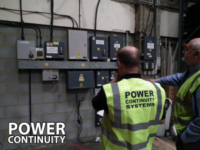The Vital Role of Consistent UPS Maintenance in Safeguarding Critical Operations
الجسم
In the fast-paced, technologically driven landscape of today's businesses, uninterrupted power supply stands as a linchpin for operational continuity. The reliance on seamless electricity delivery has heightened the significance of Uninterruptible Power Supply (UPS) systems in safeguarding critical environments against the pitfalls of power disruptions. However, the installation alone does not guarantee reliability; it's the regular maintenance that ensures these systems operate at their peak efficiency when they're most needed.Optimising Reliability Through Regular MaintenanceA UPS system's primary function is to bridge the gap between mains power failure and backup power activation, ensuring continuity of operations during outages. Yet, without periodic checks and maintenance, these systems may falter precisely when their reliability is most crucial.Routine maintenance involves comprehensive assessments of UPS components. From scrutinising internal connections and circuitry to evaluating battery health and load capacity, these inspections pinpoint potential weaknesses and rectify them before they evolve into critical issues. By identifying and rectifying problems proactively, regular maintenance significantly minimises the risk of unexpected UPS failures.Enhancing Performance and EfficiencyOver time, UPS systems, like any other technology, undergo wear and tear. Dust accumulation, battery degradation, or electronic component ageing can impair their performance. Regular maintenance sessions, inclusive of cleaning, testing, and diagnostic evaluations, counteract these issues.Such upkeep maximises operational efficiency, ensuring the UPS system can seamlessly transition to backup power without hesitation or failure. Regular checks and necessary replacements contribute to maintaining optimal performance levels, preventing dips in efficiency that could otherwise disrupt crucial operations.

A Cost-Effective InvestmentWhile some might perceive regular maintenance as an additional cost, it's fundamentally an investment in reliability and continuity. Small, routine maintenance expenses pale in comparison to the potential costs incurred from downtime resulting from a UPS system failure. Proactive maintenance mitigates the need for emergency repairs or replacements, saving businesses from the financial implications of critical disruptions.Sustained Longevity and Business ContinuityA well-maintained UPS system isn't just reliable; it's a durable asset. Scheduled maintenance, coupled with necessary upgrades, elongates the system's lifespan, ensuring it remains a steadfast safeguard against power interruptions. In sectors where continuity is non-negotiable—such as healthcare, finance, or data centres—regular UPS maintenance guarantees uninterrupted operations, safeguarding the integrity of vital http://services.In conclusion, the significance of regular UPS maintenance cannot be overstated, especially for businesses relying on UPS hire, rental, and professional UPS installer. It's the backbone of reliability and continuity in critical environments. Engaging professional maintenance services not only guarantees thorough upkeep but also reinforces the trustworthiness of UPS systems, ensuring they perform optimally when the need arises.

Businesses that prioritise regular UPS maintenance invest in their resilience, reliability, and uninterrupted operations, thereby safeguarding against potential disruptions and fortifying their position in an ever-evolving, power-dependent world.UPS hire rental systems wherever and whenever you need short term UPS power protection. Short or long term UPS Hire Rental , Power Continuity temporary UPS systems can be installed inside or outside your building. Power Continuity the biggest names in the UK for UPS Installations.








تعليقات